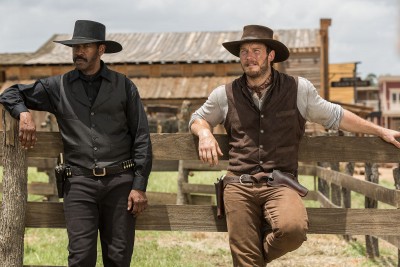
If there is one Hollywood trend that film lovers and film critics alike love to bemoan, it is the remake. Whenever a studio decides to make a new version of an older film, the internet goes into an uproar of almost biblical proportions, nitpicking at every detail just from watching a trailer and condemning the film before it even comes out.
In a twist of events, this year’s version of “The Magnificent Seven,” presented by MGM and Columbia Pictures, is not a remake. Rather, it’s just the 21st century version of the original “The Magnificent Seven” story. Much like the 1960 film — that era’s version of Kurosawa’s 1954 “Seven Samurai” — all variations are on the theme of seven outlaws banding together to save a defenseless town.
The film’s plot is loosely similar to the 1960 version. The Seven are set to defend the mining town of Rose Creek from robber baron Bartholomew Bogue (Peter Sarsgaard), who intends to destroy the town for more land to mine. Two of the townsfolk, Emma Cullen (Haley Bennett) — whose husband was killed by Bogue’s men — and fellow freedom fighter Teddy Q (Luke Grimes), set out to find men brave enough to fight an army for a fistful of dollars each.
This new Seven are richer and more rounded characters than their predecessors. Sam Chisolm (Denzel Washington), the leader of the Seven, is a marshall by day but a bounty hunter by trade who has ties to Bogue; Goodnight Robicheaux (Ethan Hawke), uses shotguns like sniper rifles; Billy Rocks (Byung-hun Lee), Robicheaux’s associate, throws knives; Red Harvest (Martin Sensmeier) is a Comanche bowman on a personal quest; Jack Horne (Vincent D’Onofrio) chops his enemies with a hand-axe rather than using a gun; Vasquez (Manuel Garcia-Rulfo) is a Mexican outlaw who risks his life to not get chased down by Chisolm; and last but certainly not least, Joshua Faraday (Chris Pratt) is the gang’s resident jokester and gambler with a penchant for magic tricks and explosions.
Gone, then, is the predominantly white gang of Seven of the past. This new and improved band of outlaws and misfits is not only more racially aware than the previous version, but also even more historically accurate — Chisolm and Red Harvest even have a full dialogue in the Comanche language.
Each character not only works perfectly well with the others, but the minor inner conflicts between them (such as Chisolm and Robicheaux having fought in opposite sides during the Civil War, or Horne’s prior job as a scalp-hunter, which obviously bothers Red Harvest) give them more depth than would be expected of action heroes in a 2016 movie.
The rest of the cast is somewhat forgettable, however. For putting so much importance onto Cullen at the beginning of the film, she quickly loses her place to the main Seven up until way later in the movie, and Teddy Q is pretty much all but forgotten. Sarsgaard’s Bogue is sinister, sure, but he isn’t terrifying enough or even cheesy enough to be memorable. It really appears that the writers put all of their focus on the Seven, with the rest of the world just revolving around them.
Much like the main cast, the plot is certainly an improvement from the original. The very modern action-movie trend of fast-paced scenes and dialogue works in the film’s favor: the audience still gets those vast, sprawling, beautiful scenic shots without losing the plot momentum.
The action sequences themselves are well paced and not overdone, and the peril the Seven constantly find themselves in seems legitimately genuine — a great example would be the first time the Seven fight together against Bogue’s men, each showing off their skills under fire while deftly defeating the bad guys.
The ending, of course, features a giant battle between the Seven and the village versus Bogue’s army, but it’s how the battle unfolds that really makes it spectacular.
“The Magnificent Seven” is clearly more than just an old movie with a fresh coat of paint. With its fast-paced action, compelling characters and well-written dialogue, it would have fit in with “Ghostbusters” and “Captain America: Civil War” in this year’s summer lineup. Instead, much like a lone cowboy, it came into the dusty old town that is the fall movie season, saved it if only for a day, and rode into the sunset.



















































































































